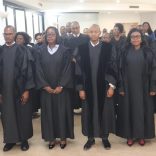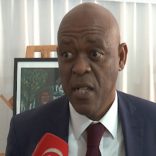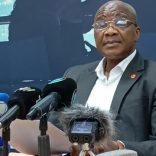Mozambique: Mondlane denounces fake WhatsApp channel - AIM report
Mozambique: Gov’t disburses MT 180 million to fund political party campaign

File photo: Savana
The Government of Mozambique will disburse nearly 200 million meticais to fund the electoral campaign of political parties which submitted their candidacies and have been approved to participate in the legislative, presidential and provincial assembly elections on 15 October, Savana reports today.
Member of the National Election Commission (CNE) Rodrigues Timba told MediaFax that a total of 180 million meticais would be subdivided into three “packages” corresponding to the three elections (presidential, legislative and provincial assemblies).
From what we’ve learned, each separate poll will use up 60 million meticais, making a total of 180 million for all three processes.
For example, those who participate only in the provincial elections will compete for 60 million, while those in both the provincial and legislative elections will compete for 120 million.
The 180 million meticais will be disputed by the parties, coalitions of parties and groups of citizens registered and accepted for presidential, provincial and legislative elections. This group of parties is known to consist only of Frelimo, the ruling party, Renamo and the Democratic Movement of Mozambique (MDM).
The amount, according to the source, will be disbursed by the Ministry of Economy and Finance and the parties should have access to the money 21 days before the start of the election campaign, scheduled, in this case, for 31 August this year.
“This amount will be delivered in phases. The first phase is before the election campaign so that parties can organize the campaign. The second and third tranches will be disbursed midway through the campaign. However, the availability of the last two tranches is conditional on the presentation of justifications and proof of expenses that will have meanwhile been made during the electoral campaign.”
Specifically, the first tranche represents 50 percent of the value calculated according to the competitor’s participation “sample”, and the last two, 25 percent each.
The last two instalments will be disbursed upon approval by the CNE of the accounts of the 50% previously received.
The allocated amount is to be spent only on campaign material, travel, bank charges, and not on wages, food for candidates, purchase or rehabilitation of means of transport, or the purchase, construction or rehabilitation of facilities.
To ensure the principle of equal treatment of political parties and groups competing for elections, the state will allocate funds for the financing of the electoral campaign in observance of article 38 (1) of Law 8/2013 of 27 February, as amended and republished by Law No. 2/2019 of 31 May.
Twenty-one days before the start of the election campaign, the National Election Commission will announce the amount that the state will make available to fund the campaigns of the political organisations for next October’s general elections and provincial assemblies, as well as the criteria to be followed in the distribution of this amount, according to the terms of paragraph 2 of article 37 of Law No. 2/2019 of 31 May.
Electoral law provides for two forms of state funding of political campaigns. The first, called direct public funding, involves the transfer of funds from the state budget to the proposing parties, coalitions or groups of citizens, and the second, called indirect public funding, occurs through the payment of free “airtime” to political formations. public media for advertising purposes and the exemption of tax charges on the importation of campaign materials.
The transfer of funds for financing the campaigns of competing political formations to general and legislative elections follows legal criteria defined in each election. According to electoral legislation, it is up to the National Election Commission to define the criteria for allocating funds.
On the criterion of distribution, Timba notes that the biggest slice goes to the political party running for the largest number of constituencies.
Over the past four elections, the allocation criteria set by the CNE were based, as a rule, on parliamentary representation and the proportion of nominations submitted, according to the places to be filled.
For this year’s elections, the amount allocated is twice that of the 2014 election, which was budgeted at 70 million meticais.
On Tuesday, the Centre for Public Integrity (CIP) published a study that found that, from the analysis of the allocation criteria set by the CNE over the last four election years until the general elections in 2009, these were based on parliamentary representation and the proportion of nominations according to the seats to be occupied.
However, a distribution based on the principle of parliamentary representation results in a larger allocation of funds to the political formations which succeeded in electing MPs in the previous election. Such an arithmetic benefits the already consolidated parties to the detriment of other political formations within the electoral campaign. In other words, new or extra-parliamentary parties competing for the first time are at a disadvantage compared to parties with parliamentary seats from the previous legislature. Even among parliamentary parties, the biggest slice was allocated to the party with the most seats.
“An analysis of the funds allocated to the political formations competing for the legislative elections shows, for example, that, in 1999, the amount allocated to Frelimo (1.6 million meticais), with seats in the Assembly of the Republic, was 678% of the total allocated to parties such as PALMO, UD, PT, SOL (236,000 meticais). Even without seats in the Assembly of the Republic, these parties were running in the legislative elections in all constituencies.
In the same year, the amount allocated to Renamo, because of it having seats in the Assembly, was 941,00 meticais, or 398% of the 236,000 meticais allocated to all three parties, the study points out.
The document also notes that, in 2004, 10 parties running for approximately all parliamentary seats each received between 945,000 and 953,000 meticais, but the two parties with parliamentary seats received much more. Frelimo received 7.98 million meticais more and Renamo, 7.2 million meticais. In addition, the parties running for the presidency (Frelimo, Renamo and MDM) received, separately, three million meticais. Thus, Frelimo received from the government 12 million meticais more than all the other parties that competed for all the parliamentary seats.
In 2009 the allocation of state funds again favoured Frelimo by the way the overall amount of 50 million meticais was divided into four parts. The three parties (Frelimo, Renamo, MDM) that ran for the presidential elections got a quarter of the total, with 4.2 million meticais each. The two parties with parliamentary seats shared another quarter of the value, with Frelimo receiving seven million meticais and Renamo-UE receiving 4.5 million.
The 19 other parties and coalitions running for the legislative elections split another quarter of the amount. Those competing for all seats or most seats received only between 1.9 to 1.5 million meticais each.
Still in 2009, the first time provincial assembly elections were held, and in which only four parties competed, Frelimo 7.9 million got and Renamo 3.6 million. Thus, Frelimo received 22 million from the government, while Renamo (including the electoral union) received 14.2 million. The third party running for the presidential election, the MDM, received 5.5 million. The largest extra-parliamentary competitor, ‘Os Verdes’ [Green Party], received only 1.5 million.
This means, for example, that Frelimo received 14 times more money from the government than the Green Party. In 2009, the amount allocated to Frelimo (eight million meticais) for having parliamentary representation was equivalent to 500% of the total amount (1.6 million meticais) allocated to parties like the PLD, which, though without seats in parliament, competed for the legislative elections in almost all constituencies.
The cost of this year’s election, set at about 14.6 billion Meticais, is roughly double the cost of the 2014 general election. At the moment, the government still doesn’t know where 50% of the budget is coming from, it having at present only 6.5 billion earmarked.
Recently, Economy and Finance Minister Adriano Maleiane has signalled a strong likelihood of resorting to cuts in some projects. Another approach would be resorting to an amending budget, if the international community provides the amount missing.












Leave a Reply
Be the First to Comment!
You must be logged in to post a comment.
You must be logged in to post a comment.